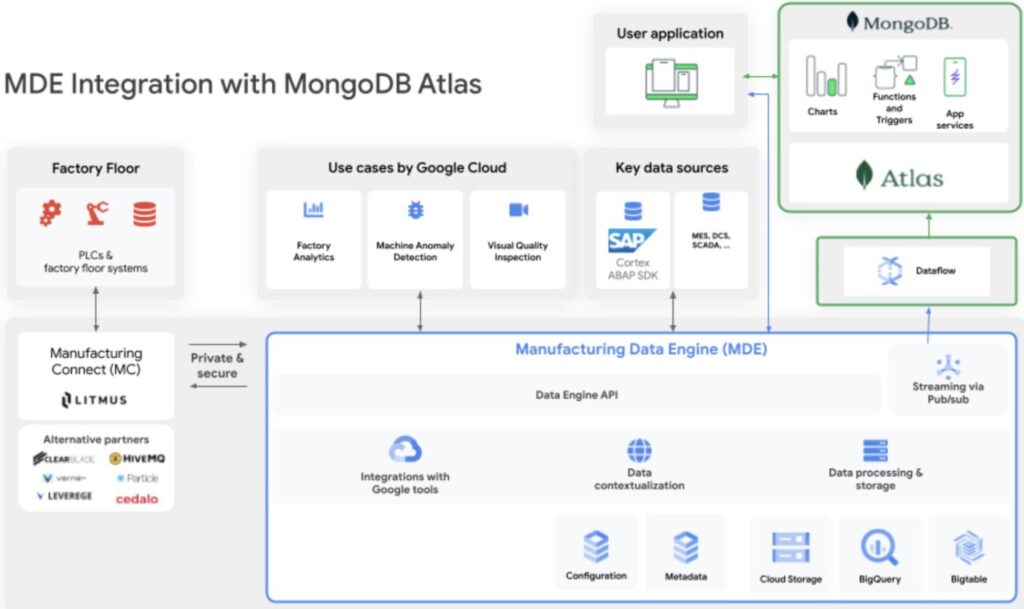The manufacturing industry is undergoing a transformative shift from traditional to digital, propelled by data-driven insights, intelligent automation, and artificial intelligence. Traditional methods of data collection and analysis are no longer sufficient to keep pace with the demands of today’s competitive landscape. This is precisely where Google Cloud’s Manufacturing Data Engine (MDE) and MongoDB Atlas come into play, offering a powerful combination for optimizing your factory floor.
Unlock the power of your factory data
MDE is positioned to transform the factory floor with the power of cloud-driven insights. MDE simplifies communication with your factory floor, regardless of the diverse protocols your machines might use. It effortlessly connects legacy equipment with modern systems, ensuring a comprehensive data stream. MDE doesn’t just collect data, it transforms it. By intelligently processing and contextualizing the information, you gain a clearer picture of your production processes in real-time with a historical pretext. It offers pre-built analytics and AI tools directly addressing common manufacturing pain points. This means you can start finding solutions faster, whether it’s identifying bottlenecks, reducing downtime, or optimizing resource utilization. Conveniently, it also offers great support for integrations that can further enhance the potential of the data (e.g. additional data sinks).
The MongoDB Atlas developer data platform enhances MDE by providing scalability and flexibility through automated scaling to adapt to evolving data requirements. This makes it particularly suitable for dynamic manufacturing environments. MongoDB’s document model can handle diverse data types and structures effortlessly while being incredibly flexible because of its native JSON format. This allows for enriching MDE data with other relevant data, such as supply chain logistics, for a deeper understanding of the factory business. You can gain immediate insights into your operations through real-time analytics, enabling informed decision-making based on up-to-date data. While MDE offers a robust solution for collecting, contextualizing, and managing industrial data, leveraging it alongside MongoDB Atlas offers tremendous advantages
Inside the MDE integration
Google Cloud’s Manufacturing Data Engine (MDE) acts as a central hub for your factory data. It not only processes and enriches the data with context, but also offers flexible storage options like BigQuery and Cloud Storage. Now, customers already using MongoDB Atlas can skip the hassle of application re-integration and make this data readily accessible for applications. Through this joint solution developed by Google Cloud and MongoDB, you can seamlessly move the processed streaming data from MDE to MongoDB Atlas using Dataflow jobs. MDE publishes the data via a Pub/Sub subscription, which is then picked up by a custom Dataflow job built by MongoDB. This job transforms the data into the desired format and writes it to your MongoDB Atlas cluster. Google Cloud’s MDE and MongoDB Atlas utilize compatible data structures, simplifying data integration through a shared semantic configuration. Once the data resides in MongoDB Atlas, your existing applications can access it seamlessly without any code modifications, saving you time and effort. The flexibility of MDE, combined with the scalability and ease of use of MongoDB Atlas, makes this a powerful and versatile solution for various data-driven use cases such as predictive maintenance and quality control, while still providing factory ownership of the data. Instructions on how to set up the dataflow job are available in the MongoDB github repository.
Conclusion
If you want to level up your manufacturing data analytics, pairing MDE with MongoDB Atlas provides a proven, easy-to-implement solution. It’s easy to get started with MDE and MongoDB Atlas.
MongoDB.local NYC
Join us in person on May 2, 2024 for our keynote address, announcements, and technical sessions to help you build and deploy mission-critical applications at scale.
Use Code Web50 for 50% off your ticket!
Source: Read More


